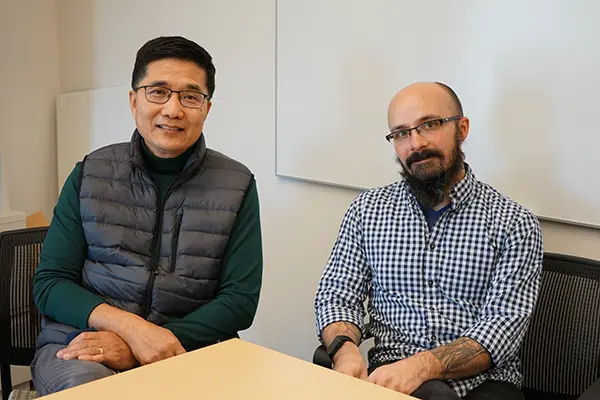Sheldon Zhang and Jason Rydberg Win $1.9 Million in Grants from State Department
 Image by K. Webster
Image by K. Webster
11/12/2021
By Katharine Webster
The U.S. Department of State has awarded two major grants to faculty in the Department of Criminology and Justice Studies to figure out the extent of human trafficking of domestic servants in Tunisia – and to try to reduce it.
Department Chair Sheldon Zhang, an expert in human trafficking, received an initial grant of $450,000 in early 2020 to work with Tunisian partners on estimating how many domestic servants are subject to treatment that constitutes labor trafficking, including wage theft, physical and sexual abuse, and working conditions that amount to indentured servitude.
The grant was part of the Prevalence Reduction Innovation Forum sponsored by the State Department and overseen by the University of Georgia, which awarded grants to six teams of researchers to try different methods of estimating the prevalence of sex and labor trafficking in countries where a clear problem had been identified.
Zhang says Tunisia is ripe for evaluation and intervention. In the past few years, it has passed anti-trafficking legislation and a law regulating hours, pay and working conditions for domestic servants. It has a national anti-trafficking commission, and several nongovernmental organizations also do rescue work and advocate for victims of sex and labor trafficking.
But despite a growing number of arrests for violating the new trafficking and labor laws, no prosecutions have resulted, Zhang says.
“There have been more than 800 arrests, but not a single prosecution,” he says. “People don’t think it’s a crime; they think it’s just bad, unscrupulous employers taking advantage of immigrants” from West Africa.
While the original grants aimed to assess how widespread the problem was in various countries, researchers and the State Department wanted to do more. They decided to try various interventions aimed at reducing sex and labor trafficking, and then do follow-up testing to see if the interventions worked.
“The State Department gives out tons of funding to help combat human trafficking and forced labor, but most of the programs getting these grants weren’t evaluated in the past,” Zhang says. “Now, the State Department wants to know the impact of this funding around the world.”
The State Department’s Office to Monitor and Combat Trafficking in Persons invited each group of researchers to propose interventions and apply for additional funding. Zhang and Assoc. Prof. Jason Rydberg, co-director of the university’s Center for Program Evaluation, recently received an End Modern Slavery Award of $1.46 million to carry out interventions with Tunisian partner Avocats Sans Frontieres (Lawyers Without Borders).
Rydberg, an expert on estimation research and methods, says the researchers are developing a survey for domestic servants, most of whom are women and children. Then, the Tunisian Association of Democratic Women will seek out places where servants congregate – such as bus stops, markets, parks and fairgrounds – to interview them about working conditions, restrictions on their movements and other forms of abuse.
The main intervention the team plans to try is based on the theory of deterrence, Zhang says. Avocats Sans Frontieres will seek out high-profile cases with multiple victims, file big-money civil lawsuits against the employers, and use social media to publicize the lawsuits as widely as possible. The “fear factor” is usually an effective deterrent, Zhang says.
Rydberg says the researchers also will try to figure out the barriers to criminal prosecution. Avocats Sans Frontieres can pass along evidence to prosecutors, and the grant can be used to address other obstacles, such as providing training to prosecutors and reaching out to potential victims.
One suspected barrier is that an estimated 85% of domestic servants in Tunisia come from West African countries, predominantly Ivory Coast. Although many enter the country legally, it is nearly impossible for them to obtain work permits – and if authorities discover they’ve overstayed their visas to work illegally, they can face large fines, Zhang says.
That makes immigrant workers especially vulnerable to abuse and may make them afraid to seek help, he says. Even when they do seek help and an organization like Avocats Sans Frontieres brings a civil suit against an employer on their behalf, often the employer walks away with only a small fine.
The research team’s goal is for Avocats Sans Frontieres to publicize particularly egregious cases, while working with authorities to make sure the victims are protected.
“If we win some civil lawsuits and publicize them, it will send shock waves through the community. People will realize there are costs to violating the laws, in finances and reputation,” Zhang says. “We think fear of liability will improve the domestic labor market.”
And even one successful criminal prosecution of an employer, resulting in prison time, would be a major deterrent, he says.
“We hope we can get prosecutors in Tunisia to break their zero record,” he says. “Hopefully, that will make employers more careful.”



